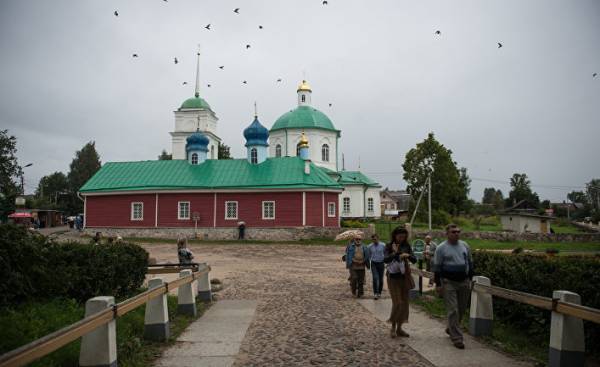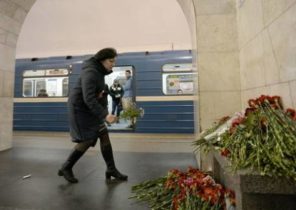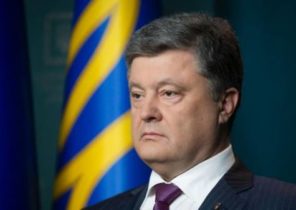
Nizhny Novgorod — Russia closed schools and hospitals, the economy is stagnating, dying villages, but one industry is booming: the monasteries. The number of monasteries for fleeing the secular world, devoted themselves to prayer, who has chosen the rejection of ownership, humility and absolute obedience, had attained to Imperial times — more than 800. Although, since the Moscow Patriarchate was part of the vertical of power and started to participate in the formulation of state ideology, many Christian minded Russians because of this, very annoyed. But at the same time, many of the best scholars, scientists, academicians take monastic vows. Instead of trying to break into a seemingly hopeless fight against corruption and injustice, they decided to set an example of self-denial, to sacrifice their own interests and thereby make the world a better place.
In the new, dedicated to the God of the brethren, public pyramid exemplary cleaned. Some monasteries replace the bad or missing social institutions such as schools, hospitals or shelters. Sponsorship millions will steadily be attracted by the monasteries, otherwise the capital will flow away from Russia. Some of the monks drive expensive cars. The saints live in luxury. Not surprisingly, the monastery, whose economic importance is constantly growing, loyal to President Putin.
A place of pilgrimage where pilgrimage tourism adopted an industrial scale, the convent of Diveevo, located 200 kilometers South of Nizhny Novgorod, which is accessible by stresovice the roads leading along the ghosts of villages and untilled fields. Posters on billboards at the entrance proudly report that this Holy place is considered the fourth earthly destiny of the virgin, which she regularly attends, along with Georgia, Holy mount Athos, Greece and Kiev-Pechersk Lavra. According to some estimates every year in Diveevo, where today once again pray and work to nearly 500 nuns and novices, comes of one million visitors. Hard erected shelter to six thousand souls. Currently 16 hotels for pilgrims open additional branches appear shopping malls. The cafeteria here willing to call traitname, can be found on every corner.
We are located in the hotel of the monastery, where the entrance shoes put in the closet and sleep on the male or female side in a room with four or five hard beds. Bounce suitcases on wheels, drinking alcohol or the use of someone else’s dressing room here, “no bless”, in the common dining room posted house rules. Our traveling companions — two holidaymakers from family fun father’s family, who believe in the healing powers of bathing in the monastery source. And Muscovite in monastic garb, holding a way to the convent in the nearby village of Kadom. In a narrow corridor, the young man delves into the reading of the prayer book.
For the morning service, during which angelic singing nuns sounds of choirs, a huge Trinity Cathedral is completely filled. Besides women and the elderly, you can see suddenly a lot of young men, however, among them in appearance and no typical winners. After the Liturgy there was a turn for the luxurious reliquary with the relics of St. Seraphim of Sarov (1754-1833), the monastery’s founder, and a legendary spiritual guide. Seraphim commanded to dig a “Sacred groove” with a length of 777 metres, which, he claimed, leads on the trail of the mother of God. This groove is the main attraction. Constant inhabitants of the monastery and the pilgrims circumambulate around the circle groove counterclockwise, reading the prayers of the mother of God.
The farm of the monastery are also close to perfection. Sent from Moscow masters of gold mosaics adorn the interior and exterior walls of the newly renovated Annunciation Cathedral, the fourth in the monastery. Diveyevo nuns, which already in the nineteenth century, was known for his enlightened humility, concerned about the Affairs. In the reception room for pilgrims, they charge for accommodation or a tour to save on taxes is issued as a donation. And those who can’t afford to buy the icons in the gift shop at the monastery, there buy bread according to the recipe Seraphim, the main food of many pilgrims and gifts to their loved ones.
Enthusiastic employee of the monastery says goodbye to us and invites soon to come back here again. When we admit that willingly would do it, if the roads around Diveyevo would be more passable, she laughingly replied that wait we can’t. In the Middle ages, the monastery is the rescue an island from which emanate impulses of overcoming the decadence that reigns around. We drove up to the Sanaksar monastery, a hundred kilometers South of Diveyevo, near the town of Temnikov in Mordovia, where the main industries are labor camps.
The monastery is located in the area of Dubravlag, where even before the 80-ies of the political prisoners were kept, among whom was the mistress of Boris Pasternak, Olga Ivinskaia, writer Andrei Sinyavsky, Yuli Daniel and Irina Ratushinskaya. Now here serve their, often very long, the sentences of criminals, including leaders of criminal gangs and Chechen terrorists. Surprisingly good roads lead past walls with barbed wire and guard towers, prison guards in light blue camouflage uniforms stand in our way.
Sanaksar monastery and Diveyevo, was closed during the Soviet era and was used as a garage for agricultural machinery, much less, it is home to 50 monks and novices. In the main Church there is a icon of the Royal Admiral Fyodor Ushakov (1745-1817) who spent the last years of his life in this country, and which, not least at the request of the brothers living in the Sanaksar monastery, was canonized in 2001. In the shop at the monastery we acquire a beautifully illustrated life of this “Holy, righteous warrior” who defeated the superior numbers of the Turkish fleet in the Kerch liberated Corfu from the French invaders, in the port of Kherson defeated the plague, have shown Christian mercy to the defeated enemy, took care of their sailors, and in old age on the poor. As a national of the Russian Saint Alexander Nevsky, who was canonized for his victory over the German knights order. The Church gives to the military successes of high spiritual value.
Two monk out of the monastery Sanaksar care of prisoners and twice a month conduct prison services. But they don’t want to talk about it. Talkative was a fellow that shows us a monastery here provided shelter for pilgrims with marble floors and stylish furniture, there existing on the donations of the dental office in which a local doctor treats the servants of the Lord. Loved the divine services in the camp, tells the friendly monk, especially as the priest in addition to Holy communion, brings the bread and cheese from the monastery of the products, and prisoners should not work during the Liturgy. The prison administration also supports this mission.
Some campers even want to after his release to go to the monastery; strict as in the barracks, the daily routine and labor service remind them about the camp, he says, laughing. The leadership of the monastery, however, wanted to prevent this, the brotherhood should not become infected with the customs of the underworld. But this rule does not seem to iron: in the bath it turns out that some brothers have tattoos with religious architecture all over the body, gives the monk. Actually it was a gangland-style attempt to Express thus combat readiness to protect Christianity.
In Mordovia we visited another Holy Varsonofievskiy the monastery where the nun Jeremiah tries to heal the sick. Mother Jeremiah, who in secular life was a medic, she said, healed herself from cancer. A nun holds office hours at the Church twice a week. She collects their patients before the altar of the virgin and first of all explains how to clean your body and get rid of parasites. Then she dedicates time each specific case. A pilgrimage to the mother Jeremiah went and our friend from the neighbouring Ryazan region with the tumor, on the insistence of his deeply devout wife. The nun gave him a few recommendations for a course of detoxification and medications that she prepares herself from beeswax and herbs during the prayer and distributed free of charge to cancer patients. To do the operation, she advised against it. Our friend, in spite of this, decided on surgery, which, however, he lived only a few weeks. In the monastery shop we buy organic food, excellent fresh cheese and sour cream, cooked by the nuns.
Finally, we arrive at St. Nicholas Chernoostrovsky monastery in the small town of Maloyaroslavets in the South-West of Moscow, here are the children whose parents died, were in prison have alcohol or drug dependence. The abbess of Nicholas, which in this world was a specialist in the field of electronic data processing and artificial intelligence, restored the monastery in the early 90-ies, when Russia was plunged into the icy water of a market economy, and many families destroyed. In fact, the nuns have to devote themselves to prayer, says the mother of Nicholas, but in catastrophic situations, they should engage in social Affairs. The abbess and her sisters initially worked with the social orphans and drug-addicted teenagers, and in 1995 opened at the convent orphanage for children from disadvantaged families. Today, there is the spacious quadruple rooms are home to 50 girls ages eight to 18 years from all corners of Russia.
We want to raise these children Mature and responsible mothers of the family, says the mother of Nicholas. They get the school recognized by a state education from teachers from the city, some even graduate. Every girl has a nun as a Trustee. In the city they can go as a group and with the consent of the monastery, access to the Internet. But they sing and dance in the monastery ensemble “Otrada”, which performs at festivals and also in Greece, Italy, Austria, spiritual, folk and Patriotic music. During a concert at the Palace of culture of Maloyaroslavets pupils in bright costumes perform temperamental Russian dances. Then in the marine uniform appears younger, which is about ten years to sing into the microphone a song about the grandfather who defended their homeland during the Second world war, came to Berlin and it is a great example. In the end, all sing the Serbian anthem “Faith is eternal, glorious faith, our Orthodox faith”.
Abandoning one’s own desires — the first rule of monastic life. The vertical principle, obedience to superiors, that’s what saves us, like the mother of Nicholas, who settled us into the guest room of the Bishop, luxurious room with gorgeous lamps and curly plush furnishings. The arbitrariness of man, his disobedience to God ruined the world teaches it. It is not surprising that the school hallway is decorated with a picture of President Putin, and in front of the monastery wall, where field Marshal Mikhail Kutuzov in 1812 fought his battles with the retreating French, in 2012, the Church was built. Relation to others must be based on inclusive love for people, which generates only the love of God — so preaches the mother of Nicholas. Really impressive how carefully and at the same time firmly nuns lead unsuspecting children, and also like to recognize the best in the visitors and turn to him. They are visible to the constant inner work.
Not everyone will sustain it. In the last year from the St. Nicholas monastery Chernogorskogo escaped novice Maria Kikot and wrote a book about his experience. Under the title “confessions of an ex-novices” Chicot describes how the abbess, calling to join other sisters who regularly “cursed” before the rest of the Assembly of nuns, which, for example, the poor have completed the task or too late drinking tea. However, some humiliated sister was really sick. Furthermore, the author complains about a lot of novices, who have to live in rooms similar to a dog kennel, and from seven in the morning till night to clean, cook and work in the yard. Many novices have children who grow up in the monastery. But contact with them this mothers forbidden, because it would distract from the work with which they try to fulfill their duty to the monastery. Former novice compares the order in the monastery with the totalitarian sect.
“Confession” Kikot has prompted many of the inmates of the monasteries to talk openly about similar issues. The monk Diodor, who lives in a monastery in the Volga Republic of Mari El, confirms that, unfortunately, happens that the Abbot shouts for half an hour on the monks as an army Colonel. Often the victims began then to drink, evidenced by Diodorus. The priest explains these shortcomings by the fact that priests often want to control as soon as possible and as many monasteries, and immature superiors observe the rules of the monasteries only superficially. Under such an authoritarian persona novices sometimes become monks with pathologically infantile personality, without moral core. On the totalitarian nature of Orthodox monasteries Diodorus still does not want to talk rather about some totalitarian manifestations, which are supported by the isolation of monastic life and obligations to obedience and sincerity.
But the road to the monastery is not a one — way street. Natalia Melentieva, which is itself 18 years was a nun in the convent near Moscow, says he knows many former inmates of the monasteries, which were now married and had children. But she was a bad nun, believes Milantiev. She did not think their own thoughts-something from the evil one and tied a romantic friendship with another nun. She left the monastery because of suspicious business woman who sought protection there, entangled their abbess, found sponsors and organized in abode of illegal sewing shop for sewing vestments for priests, and breeding workshop for the production of ceramics.
When some of the sisters wanted to return to secular life, the mother superior threatened them, that they might have something happen that they can begin to grunt and roar like animals, according to Milantiev. Fortunately, none of the known cases, nothing happens. Former nun considers himself an Orthodox believer, although almost do not go to Church. She believes that the monasteries do a good job, but they should be poor and not have a relationship to money.







